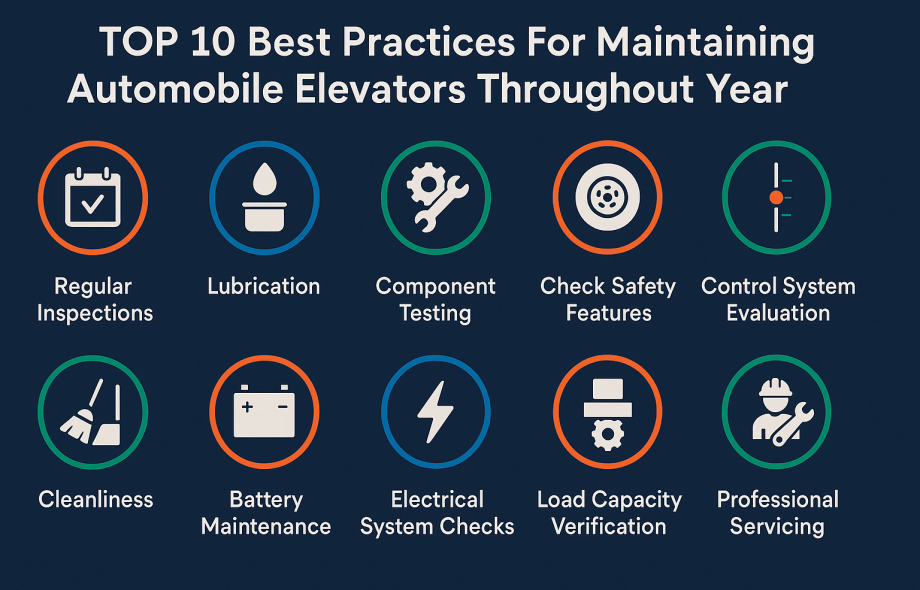Automobile elevators are used in many commercial and residential buildings. These systems are designed to lift vehicles safely and efficiently. Proper care must be taken to ensure long-term reliability.
If regular checks are not performed, serious damage can occur. Parts may wear out or stop working suddenly. Proper maintenance helps avoid costly repairs and delays.
Performance can be improved by following simple steps regularly. Safety risks are also reduced through routine inspection and cleaning.
We are one of the top automobile elevator manufacturers in Delhi are sharing best practices for maintaining automobile elevators all year:
Regular Inspections Must Be Scheduled
Routine inspections should be scheduled every three to six months. Elevator parts are often worn out without clear signs. These hidden issues can be missed without regular checks.
Inspections must always be conducted carefully by trained professionals. Safety features and key components should be closely reviewed. Faulty parts are often discovered during such routine visits.
Serious problems can be avoided with timely inspections. Equipment life can be extended through proper maintenance plans.
Elevator Tracks Must Be Kept Clean
Elevator tracks must be cleaned on a regular schedule. Dirt and debris are often collected during daily operations. If ignored, blockages can be caused by this buildup.
Smooth movement can be ensured when tracks stay clean. Clean tracks help reduce wear on moving components.
Proper cleaning should be done using the right tools. By professionals, deep cleaning is often recommended once monthly.
Lubrication Should Be Done Properly
Moving parts must be lubricated to prevent early wear. Without lubrication, friction can damage important elevator components.
Special oils and greases should be used as directed. The right products are often listed in the manual.
Lubrication is usually done during service by trained technicians. All joints and gears must be treated with care.
Smooth operation can be maintained through regular and proper lubrication.
Safety Features Must Be Tested Monthly
All safety features must be tested once every month. These include brakes, alarms, and door sensors on elevators.
Tests should be performed with care and focus by professionals. Faulty parts must be repaired or replaced immediately.
Accidents can be prevented when safety checks are done regularly. System failures are often avoided through simple monthly testing.
Hydraulic Fluids Must Be Checked Often
Hydraulic fluid levels should be checked every few weeks. Low fluid levels can cause poor elevator performance.
Fluid checks must be done during maintenance by technicians. Any leaks must be found and repaired quickly.
Dirty or old fluids should be drained and replaced. Only approved fluids must be used for refilling tanks.
Smooth lifting is ensured when fluids are clean and full. Long-term damage can be prevented with regular checks.
Professional Technicians Should Be Hired for Service
Trained technicians must be hired for all major services. Expert handling is needed for complex elevator systems and parts.
Serious issues can be missed by untrained maintenance staff. By professionals, accurate inspections and repairs are always ensured.
Proper tools and safety steps are used by experts. Manufacturer guidelines are also followed during each repair visit.
Elevator safety is improved when professionals handle the service. Long-term reliability can also be maintained this way.
Weight Limits Must Be Strictly Followed
Elevator weight limits must always be followed without exception. Overloading can cause damage to internal systems and parts.
By the best lift company in Delhi, maximum load limits are clearly specified. These limits should be checked and respected every time.
Lifting systems can be stressed when limits are ignored. Breakdowns and accidents may be caused by heavy loads.
Safe operation is ensured when weight guidelines are followed. Regular reminders should be given to all elevator users.
Electrical Systems Should Be Inspected
Electrical systems must be inspected every few months. Wires and panels can get damaged over time.
All electrical parts should be checked by certified technicians. Loose connections and faulty wiring must be repaired quickly.
Power failures can be prevented with regular system checks. Short circuits may also be avoided by timely inspection.
Proper tools must be used during every electrical test. Elevator safety depends on a stable power system.
Emergency Systems Must Be Maintained Well
Emergency systems must be checked at least once a month. These include backup power, alarms, and emergency stop buttons.
Tests should be done with great care by trained staff. Any problem must be fixed without any delay.
Elevators may stop working suddenly during power failures. With backups, vehicles can be lowered safely when needed.
User safety is improved when emergency systems are ready. Peace of mind is also given through regular checks
Maintenance Logs Should Be Kept Updated
Maintenance logs must be updated after every service check. All repairs and inspections should be clearly recorded in detail.
Notes must be written after each visit by technicians. Old issues can be reviewed through past maintenance records.
Patterns of failure can be spotted using complete logs. Future breakdowns may be avoided with this helpful data.
A proper logbook should be stored in a safe place. Records must be kept for long-term elevator care.
 :
https://in.pinterest.com/geevokelevators/
:
https://in.pinterest.com/geevokelevators/

